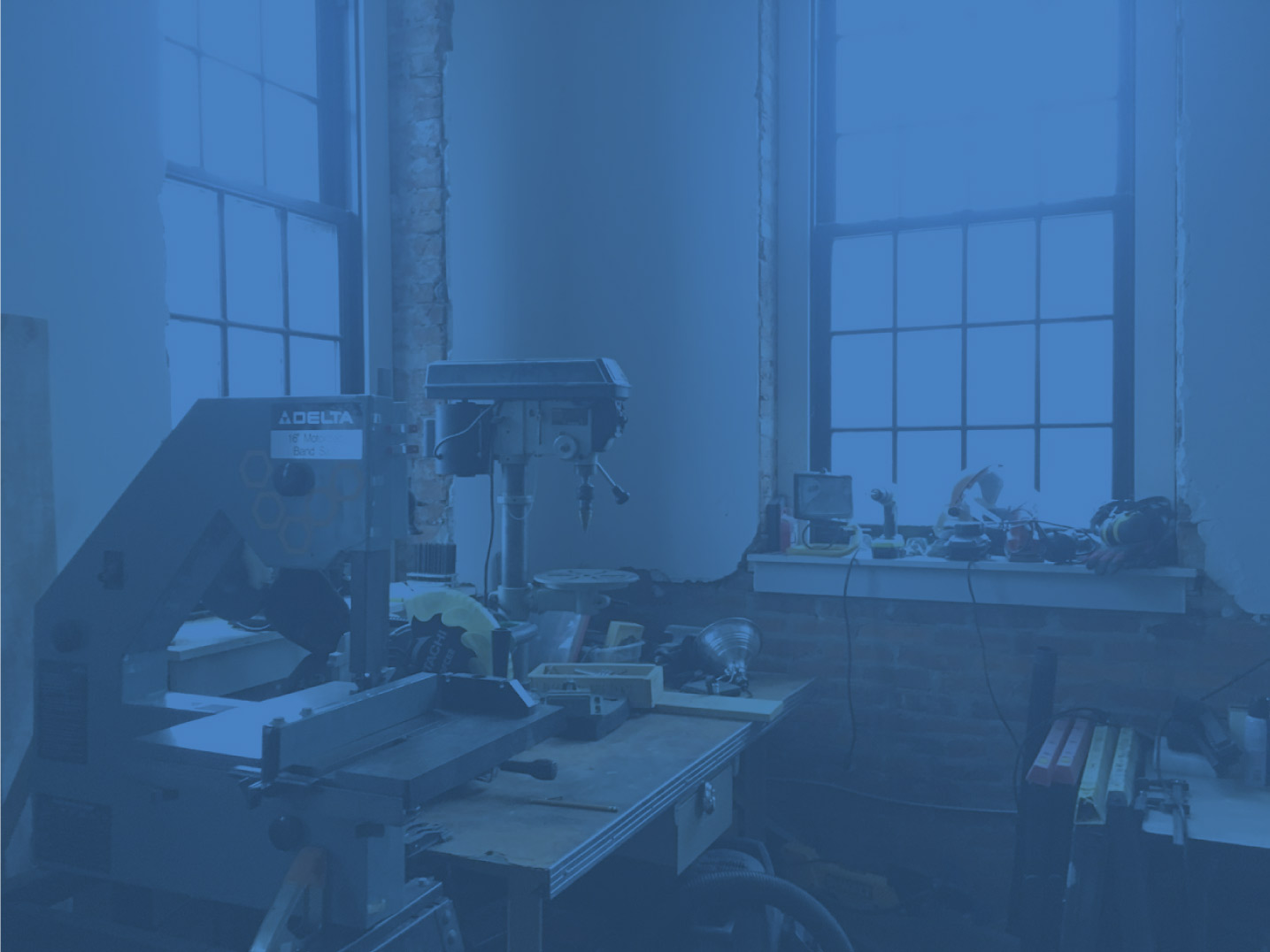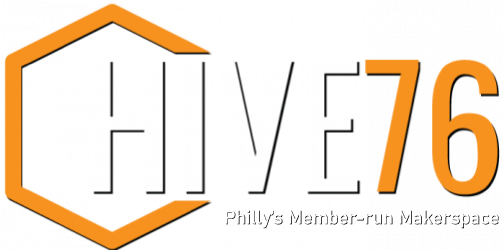I left the robot alone, and it tried to climb off the table. It succeeded and I recorded most of it.
Drying out flooded N64 carts
Software Freedom Day at Phila. Area Computer Society
Saturday September 17th, Hive76 members Chris and Peejay will be co-presenting at the Phila Area Computer Society’s Season Kickoff Software Freedom Day Extravaganza.
PACS meets at the Super Giant in Willow Grove, PA.
Open House, September 14th (and MMMM follow-up)
We had a solid, but uncrowded open house last night, complete with all the usual unstructured goings-on and a side order of semi-structured activities.

Adam Korshid, UArts Industrial Design alum and local “kombuchaneer” stopped by to share some Acetobacter Xylinum cultures and give Pez’s microbial cellulose operation a re-boot. We were joined by local artist and 915 building neighbor Ann Saintpeter. We mixed up two 44″ by 18″ trays with a special “blanco cellulose” medium in the form of sugar, yeast and apple-cider vinegar. To prepare the medium we used a rigorous, proven methodology that is generally referred to in the relevant scientific literature as TLAR (“that looks about right”) and verified our efforts using the TTAR2 methodology (“that tastes about right, too”) — as if we know what constitutes A. Xylinum’s standards of delciousness. Then we turned the bacteria loose in the pond to do their thing. We’ll deliver the resulting paper to Ann to see if it has a place in her art.

Ann also donated an Epson 7700 that needs some TLC. We spent some time working on it, and learned a thing or two. For example, we learned how to reset the counter on the maintenance tank (yay, $60 unnecessary expense avoided) and also tried to clear the black ink line by “replacing” the cartridge (boo, $50 unnecessary expense incurred when the printer apparently rejected our “spent” ink cartridge for good). We’ll re-flash those ink cartridges and show the printer who’s boss — and the printer is well worth the effort involved in rescue.
Dan and some-guy-whose-name-i-didnt-catch were off in a corner working on developing something using some framework whose-name-i-didnt-catch. Maybe Dan will edit this part.
And Monday’s MMM workshop — Great Success — we had five or six fresh faces and it seemed that a good time was had by all. We were prepared with lecture materials, if needed, but everyone in attendance seemed to be in a loosely structured kind of mood — so loose, in fact, that we didn’t bother to take a single picture. PJ has suggested a Halloween theme for the next workshop, and we’ll probably prepare some reading and code snippets in advance on things like LEDs (charlie-plexing, POV and the like) and maybe some schematics and code involving upcycling old CD drives into creepy animatronics.
Flying Robots At Hive
Yesterday we had the Philadelphia Robotics Group (PHROG) stop by for their monthly meeting. We demoed a few robots, talked other projects, and we also talked about the possibility of having classes and workshops in the future.

The coolest part of the night was when Glen Adukas demoed his flying quadrotor robot. It still needs a few tweaks here and there, but he was able to get it off the ground.
Our next meeting will be October the 13th. Feel free to join us!
Monthly Monday Microcontroller Madness: Motors!
After speaking to a few folks that expressed an interest in the MMMM workshop, it became apparent (a) most folks were newbs who want to learn the basics and (b) everyone wants to control motors. Excellent! We’ll do that.
Although motor control is potentially a vast and complex topic, with highly specialized branches, the basics are fairly easy to learn — and they’ll take you pretty far. So … we’ll be prepared to present the following items:
- DC motors
- H-bridge circuits — these let puny microcontrollers run fairly powerful motors
- Stepper motors — just a little more complex to program than DC motors and they use H-bridge circuits too
- Quadrature Encoders — these are a simple and accurate way to read the position of something
We’ll also try to discuss some organizational items — like the logistics of future workshops and the use of the MMMM GitHub, so that we can build up assets collectively, share them with the world and manage changes and contributions in a free-and-easy-but-organized way.
If you are coming , please bring:
- Yourself — If you’re a newb, welcome — If you’re an MCU Yoda, then attend you must and wisdom to newbs impart
- Some ideas
- A laptop if you have one
- You may want to install VMWare Player or VMWare Fusion before you arrive
That’s about it — see you all Monday. To whet your appetite, there is some prototype code below for reading a quadrature encoded position detector (not really elegant enough for a final effort, but it’s a start). We’ll have you writing stuff like this in no-time.
Continue reading “Monthly Monday Microcontroller Madness: Motors!”
Workshop: How to torrent
Rule #1: Don’t steal stuff.
Rule #2: Always be seeding.
Rule #3: Always have 3 rules. (I guess)
The more we use the internet, the bigger the files we move around get. There was a time when I carried around a 1.44MB floppy with all my important garbage on it. Then ZipDisks! 100MB of storage. omg. Well, now when I want to share a day’s worth of webcam footage, I need to find a way to get 4GB of video to 12 different people. This is where bittorrent shines.
We want to show you how to torrent!
- Workshop: How to torrent
- Tuesday, 9/13, at 6pm
- at Hive76, 915 Spring Garden
- Free!
- Bring a laptop with this installed: µTorrent
- Please leave a comment to RSVP
Here’s a tiny vid to explain how it works. Basically, everyone downloads one piece of the file at a time until they have the whole enchilada. Then in theory, they continue to share their copies with other’s that don’t have it yet.
This makes it easy to download huge files from large groups of users. It’s true that most torrent traffic is used for sharing pirated work. But we won’t be telling you where to get any movies or anything. We want you to know how to share your own stuff with bittorrent!
Hive Cleans Up
As mentioned previously, on Sunday, the 5th of September, members of Hive76 spent time cleaning up the street at 915 Spring Garden St. The work proved to be hard but rewarding. While there are still significant areas of garbage and weeds, we made a big impact on the areas in which we worked, paving the way for future improvements.
As the coordinator for this particular activity, I really want to give my deepest thanks to our members Mike Hogan, PJ Santoro, and Dan Toliaferro for coming out and busting their asses in the 80+F weather. I also want to thank Dave Sharp for providing some supplies as well as one of our fellow tenants at 915 Spring Garden St. for bringing us water while we were working.
More cleanup efforts are still to come, we really want to develop the garden box and maybe add more garden boxes around the building. We’d also like to spiff the place up a little it with some local art, any sort of standing sculptures that can live permanently in our new garden. If you would like to donate to our cause, with plants or dirt or trees or money to buy such things, then please contact us at [email protected].
In the meantime, check out the before and after pictures:










Cast-resin 3D printer parts


At Hive, we spent part of this summer making a bunch of cast-resin 3D printer parts. So instead of printing these parts up as we’d normally do, we made molds out of silicone mold material, and then filled these molds with resin whenever we wanted a new set.
The materials for this are cheap to acquire and easy to handle – some kind of resin (e.g. Smooth-On 326), and also material for making the silicone masters into which the resin is poured. We used Oomoo, but there are other materials out there. Other than that, you need standard stuff: mixing containers and mixers, napkins, etc.
Why would we do this? Well, in theory it’s easy and cheap if you can do it right, or if you aren’t too hung up on quality. And the parts end up looking extremely cool, especially if you use some tinting in your resin mixture. We created a couple parts sets with this tinting, which looked amazing.
However, we did run into some problems. For example, if you don’t have very elite molding skillz and materialz, you end up having to finish all the parts manually – this means deflashing, and also drilling the dozens of holes that your printer’s rods, bolts, and screws will go into. This takes a lot of time, and is very tough to do correctly. You also run the risk of breaking the parts when you drill them, which means… more molding. There are lots of other things to deal with too – what do you do if one of your master molds breaks? How do you acquire high-quality original parts to base your molds on? Etc.
Interested in trying this out for yourself? Here’s the RepRap Wiki page on the subject, and I’ve also written a lot more about our experiences here.
Monthly Monday Microcontroller Madness @ Hive76

Starting at 7 PM on Monday, September 12, Hive76 will be starting a new ongoing monthly workshop focusing solely on the wonderful world of microcontrollers.
“What’s a microcontroller,” you ask? Let’s take a quick glance at the Wikipedia page!
“Yeah, so?? Why should I care?”
- Do you have an interest in making interactive objects?
- Wouldn’t it be awesome to be able to recreate your appliances so that they worked the way that you wanted?
- Curious where crafts and electronics meet?
- What about unlocking your door by tapping on your wristwatch?
- What to learn computer programming in a more tangible way?
- Are you wondering where to get started?
“What if I’m familiar with microcontrollers, and I’m just looking for a place to talk shop, jump-start a stalled project, or help other folks learn a thing or two?”
- Come on down!!! (up, or over also apply here)
Great! Now that you’re coming, what can you expect?
You can expect to be welcomed into a friendly environment and you are encouraged to bring your ideas, aspirations, projects, and most importantly, your questions! Individual projects, group projects, build challenges, basic skill instruction, hardware buying guidance, and experts on hand! I would like to emphasize that this workshop is open to complete beginners. No prior experience with electronics OR programming needed! We’ve all got to start somewhere!
PIC, Basic Stamp, MSP430, Arduino, etc… no microcontrollers will be turned away! This is an all-inclusive, open workshop to promote learning!
The Fine Print: Materials will be available for use within the space and a limited amount of hardware will be available for purchase. If you’ve got a laptop or netbook handy, please bring it along. Instruction and guidance will be available free of charge!
(Donations are always appreciated)
This workshop is brought to you by: KBI, Inc.



